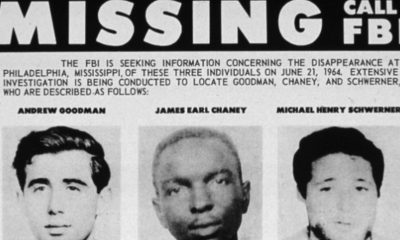National
Ferguson Police Chief Stays on the Job After Federal Report

In this Aug. 15, 2014 file photo, Ferguson Police Chief Thomas Jackson releases the name of the the officer accused of fatally shooting Michael Brown in Ferguson, Mo. On Friday, March 6, 2015, Jackson is still on the job, two days after a government report criticized his department for years of racial profiling. (AP Photo/Jeff Roberson)
JIM SALTER, Associated Press
ST. LOUIS (AP) — Ferguson Police Chief Tom Jackson was still on the job Friday, two days after a government report blasted his beleaguered department for years of racial profiling, and the mayor refused to speculate about the chief’s future, saying his role was not to “just chop heads.”
Meanwhile, three Ferguson employees implicated in racist emails exposed by that report are now gone from their jobs, the mayor said. One was identified as a city court clerk.
Calls for Jackson’s removal were renewed again this week after the Justice Department cleared Darren Wilson, the white former Ferguson officer who shot Michael Brown, of federal civil rights charges in the death of the 18-year-old, who was black and unarmed.
A second report released simultaneously found patterns of racial profiling, bigotry and profit-driven law enforcement and court practices in the St. Louis suburb that has come to represent the tension between minorities and American police nationwide.
Attorney General Eric Holder told reporters Friday that the federal government will “use all the power that we have to change the situation” in Ferguson, including possibly dismantling the police force.
“If that’s what’s necessary, we’re prepared to do that,” Holder said while accompanying President Barack Obama on a trip to South Carolina.
Asked about Jackson in an interview with The Associated Press, Mayor James Knowles III said only, “He’s still the chief.”
Knowles said city leaders are evaluating the Justice Department report “line by line” before deciding on reforms. His focus now is on understanding the report, then moving forward with whatever changes are needed.
“I’m not here to just chop heads,” Knowles said. “We have to evaluate everything in the report, pick out what are the systemic issues and what are the things we can fix.”
Jackson did not respond to interview requests on Friday but has repeatedly said he would not step down.
Ferguson city leaders will meet with Justice Department officials in about two weeks and provide a plan for improving the police force and the municipal court system, Knowles said.
“They want to hear what we will do,” Knowles said. “We’re going to hopefully work out some sort of agreement and we’ll move forward.
“We’ve got to come up with solutions now,” Knowles said.
Some experts believe the first step toward a solution is change at the top.
Larry Cunningham, professor and associate dean at St. John’s University School of Law in Queens, New York, said the removal of the chief is key to healing the racial wounds in the suburb.
“He should absolutely not stay in office and should step down,” said Cunningham, a former prosecutor in Virginia and the Bronx. “The report details a widespread pattern and practice of abuse and discrimination and dysfunction. Because it is widespread and systemic throughout the entire police department, the buck stops at the top — the person in charge — and that’s the chief.”
The report uncovered racist emails from several city employees, including some that belittled black residents or President Barack Obama. Knowles said three employees responsible for the emails ended their employment with the city on Thursday. He declined to say if they were fired or resigned and would not provide their names or titles.
But Ferguson city spokesman Jeff Small identified one of the employees as court clerk Mary Ann Twitty, who was fired. He said the other two employees worked for the police department, but he did not name them. A message left for Twitty was not returned.
The mayor said he first learned of the emails Wednesday after meeting with Justice Department officials in St. Louis. He said he was so incensed that he ordered the accounts of all three employees disabled while he was in the car returning to Ferguson after the meeting.
Knowles said there was no evidence that Jackson or other police administrators were aware of the emails.
The Justice Department report on the police department found that black drivers were more than twice as likely as others to be searched during routine traffic stops. Minority residents bear the burden of fines and court costs expected to generate $3 million this fiscal year. Black residents were more likely to face excessive force from police, often during unwarranted stops.
Some have called on the city to dissolve the 54-officer police force and allow either St. Louis County or a neighboring municipality to take over patrols. Knowles said there is “zero” percent chance of that happening.
“I don’t say that defiantly,” he said. Residents “have been asking us to keep our own department and for the citizens to have input in making changes.”
Knowles said he was disappointed that Justice Department officials waited until releasing the report to advise him and other city leaders of some of the problems.
“There’s a lot of things they could have told us sooner and we would have dealt with it,” he said.
Still, he said, it is clear that his community will benefit from the scrutiny.
“Ferguson is going to end up being reformed,” Knowles said. “You can’t draw any conclusion other than Ferguson will be better after this.”
___
Associated Press writers Jim Suhr and Alan Scher Zagier in St. Louis contributed to this report.
Copyright 2015 The Associated Press. All rights reserved. This material may not be published, broadcast, rewritten or redistributed.
#NNPA BlackPress
Recently Approved Budget Plan Favors Wealthy, Slashes Aid to Low-Income Americans
BLACKPRESSUSA NEWSWIRE — The most significant benefits would flow to the highest earners while millions of low-income families face cuts
By Stacy M. Brown
BlackPressUSA.com Senior National Correspondent
The new budget framework approved by Congress may result in sweeping changes to the federal safety net and tax code. The most significant benefits would flow to the highest earners while millions of low-income families face cuts. A new analysis from Yale University’s Budget Lab shows the proposals in the House’s Fiscal Year 2025 Budget Resolution would lead to a drop in after-tax-and-transfer income for the poorest households while significantly boosting revenue for the wealthiest Americans. Last month, Congress passed its Concurrent Budget Resolution for Fiscal Year 2025 (H. Con. Res. 14), setting revenue and spending targets for the next decade. The resolution outlines $1.5 trillion in gross spending cuts and $4.5 trillion in tax reductions between FY2025 and FY2034, along with $500 billion in unspecified deficit reduction.
Congressional Committees have now been instructed to identify policy changes that align with these goals. Three of the most impactful committees—Agriculture, Energy and Commerce, and Ways and Means—have been tasked with proposing major changes. The Agriculture Committee is charged with finding $230 billion in savings, likely through changes to the Supplemental Nutrition Assistance Program (SNAP), also known as food stamps. Energy and Commerce must deliver $880 billion in savings, likely through Medicaid reductions. Meanwhile, the Ways and Means Committee must craft tax changes totaling no more than $4.5 trillion in new deficits, most likely through extending provisions of the 2017 Tax Cuts and Jobs Act. Although the resolution does not specify precise changes, reports suggest lawmakers are eyeing steep cuts to SNAP and Medicaid benefits while seeking to make permanent tax provisions that primarily benefit high-income individuals and corporations.
To examine the potential real-world impact, Yale’s Budget Lab modeled four policy changes that align with the resolution’s goals:
- A 30 percent across-the-board cut in SNAP funding.
- A 15 percent cut in Medicaid funding.
- Permanent extension of the individual and estate tax cuts from the 2017 Tax Cuts and Jobs Act.
- Permanent extension of business tax provisions including 100% bonus depreciation, expense of R&D, and relaxed limits on interest deductions.
Yale researchers determined that the combined effect of these policies would reduce the after-tax-and-transfer income of the bottom 20 percent of earners by 5 percent in the calendar year 2026. Households in the middle would see a modest 0.6 percent gain. However, the top five percent of earners would experience a 3 percent increase in their after-tax-and-transfer income.
Moreover, the analysis concluded that more than 100 percent of the net fiscal benefit from these changes would go to households in the top 20 percent of the income distribution. This happens because lower-income groups would lose more in government benefits than they would gain from any tax cuts. At the same time, high-income households would enjoy significant tax reductions with little or no loss in benefits.
“These results indicate a shift in resources away from low-income tax units toward those with higher incomes,” the Budget Lab report states. “In particular, making the TCJA provisions permanent for high earners while reducing spending on SNAP and Medicaid leads to a regressive overall effect.” The report notes that policymakers have floated a range of options to reduce SNAP and Medicaid outlays, such as lowering per-beneficiary benefits or tightening eligibility rules. While the Budget Lab did not assess each proposal individually, the modeling assumes legislation consistent with the resolution’s instructions. “The burden of deficit reduction would fall largely on those least able to bear it,” the report concluded.
#NNPA BlackPress
A Threat to Pre-emptive Pardons
BLACKPRESSUSA NEWSWIRE — it was a possibility that the preemptive pardons would not happen because of the complicated nature of that never-before-enacted process.

By April Ryan
President Trump is working to undo the traditional presidential pardon powers by questioning the Biden administration’s pre-emptive pardons issued just days before January 20, 2025. President Trump is seeking retribution against the January 6th House Select Committee. The Trump Justice Department has been tasked to find loopholes to overturn the pardons that could lead to legal battles for the Republican and Democratic nine-member committee. Legal scholars and those closely familiar with the pardon process worked with the Biden administration to ensure the preemptive pardons would stand against any retaliatory knocks from the incoming Trump administration. A source close to the Biden administration’s pardons said, in January 2025, “I think pardons are all valid. The power is unreviewable by the courts.”
However, today that same source had a different statement on the nuances of the new Trump pardon attack. That attack places questions about Biden’s use of an autopen for the pardons. The Trump argument is that Biden did not know who was pardoned as he did not sign the documents. Instead, the pardons were allegedly signed by an autopen. The same source close to the pardon issue said this week, “unless he [Trump] can prove Biden didn’t know what was being done in his name. All of this is in uncharted territory. “ Meanwhile, an autopen is used to make automatic or remote signatures. It has been used for decades by public figures and celebrities.
Months before the Biden pardon announcement, those in the Biden White House Counsel’s Office, staff, and the Justice Department were conferring tirelessly around the clock on who to pardon and how. The concern for the preemptive pardons was how to make them irrevocable in an unprecedented process. At one point in the lead-up to the preemptive pardon releases, it was a possibility that the preemptive pardons would not happen because of the complicated nature of that never-before-enacted process. President Trump began the threat of an investigation for the January 6th Select Committee during the Hill proceedings. Trump has threatened members with investigation or jail.
#NNPA BlackPress
Reaction to The Education EO
BLACKPRESSUSA NEWSWIRE — Meanwhile, the new Education EO jeopardizes funding for students seeking a higher education. Duncan states, PellGrants are in jeopardy after servicing “6.5 million people” giving them a chance to go to college.

By April Ryan
There are plenty of negative reactions to President Donald Trump’s latest Executive Order abolishing the Department of Education. As Democrats call yesterday’s action performative, it would take an act of Congress for the Education Department to close permanently. “This blatantly unconstitutional executive order is just another piece of evidence that Trump has absolutely no respect for the Constitution,” said Rep. Maxine Waters (D-CA) who is the ranking member on the House Financial Services Committee. “By dismantling ED, President Trump is implementing his own philosophy on education, which can be summed up in his own words, ‘I love the poorly educated.’ I am adamantly opposed to this reckless action, said Rep. Bobby Scott who is the most senior Democrat on the House Education and Workforce Committee.
Morgan State University President Dr. David Wilson chimed in saying “I’m deeply concerned about efforts to shift federal oversight in education back to the states, particularly regarding equity, justice, and fairness. History has shown us what happens when states are left unchecked—Black and poor children are too often denied access to the high-quality education they deserve. In 1979 then President Jimmy Carter signed a law creating the Department of Education. Arne Duncan, former Obama Education Secretary, reminds us that both Democratic and Republican presidents have kept education a non-political issue until now. However, Duncan stressed Republican presidents have contributed greatly to moving education forward in this country.
During a CNN interview this week Duncan said during the Civil War President Abraham “Lincoln created the land grant system” for colleges like Tennessee State University. “President Ford brought in IDEA.” And “Nixon signed Pell Grants into law.” In 2001, the No Child Left Behind Act was signed into law by President George W. Bush which increased federal oversight of schools through standardized testing. Meanwhile, the new Education EO jeopardizes funding for students seeking higher education. Duncan states, PellGrants are in jeopardy after servicing “6.5 million people” giving them a chance to go to college. Wilson details, “that 40 percent of all college students rely on Pell Grants and student loans.”
Rep. Alma Adams (D-NC) says this Trump action “impacts students pursuing higher education and threatens 26 million students across the country, taking billions away from their educational futures. Meanwhile, During the president’s speech in the East Room of the White House Thursday, Trump criticized Baltimore City, and its math test scores with critical words. Governor West Moore, who is opposed to the EO action, said about dismantling the Department of Education, “Leadership means lifting people up, not punching them down.”
-

 #NNPA BlackPress3 weeks ago
#NNPA BlackPress3 weeks agoTarget Takes a Hit: $12.4 Billion Wiped Out as Boycotts Grow
-

 Activism2 weeks ago
Activism2 weeks agoUndocumented Workers Are Struggling to Feed Themselves. Slashed Budgets and New Immigration Policies Bring Fresh Challenges
-

 #NNPA BlackPress3 weeks ago
#NNPA BlackPress3 weeks agoBREAKING Groundbreaking Singer Angie Stone Dies in Car Accident at 63
-

 #NNPA BlackPress3 weeks ago
#NNPA BlackPress3 weeks agoApple Shareholders Reject Effort to Dismantle DEI Initiatives, Approve $500 Billion U.S. Investment Plan
-

 #NNPA BlackPress3 weeks ago
#NNPA BlackPress3 weeks agoNAACP Legend and Freedom Fighter Hazel Dukes Passes
-

 #NNPA BlackPress3 weeks ago
#NNPA BlackPress3 weeks agoSeniors Beware: O’Malley Says Trump-Musk Cuts Will Cripple Social Security
-

 Activism3 weeks ago
Activism3 weeks agoOakland Post: Week of February 26 – March 4, 2025
-

 #NNPA BlackPress3 weeks ago
#NNPA BlackPress3 weeks agoNNPA Launches ‘Missing & Black 2025’ Campaign to Spotlight Disparities in Media Coverage of Missing Black Individuals

























































